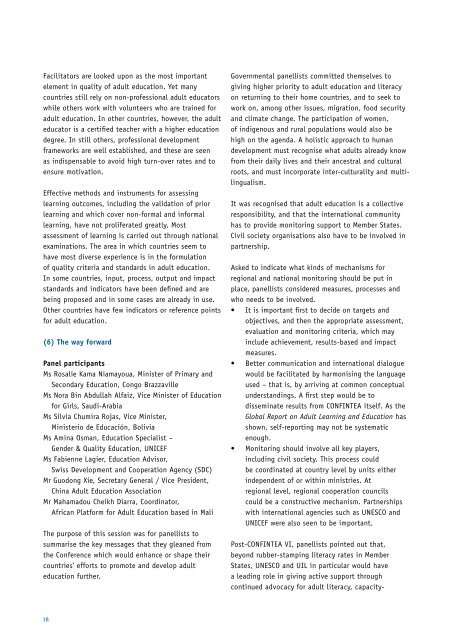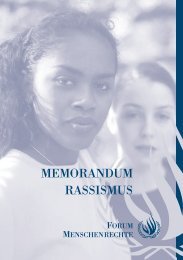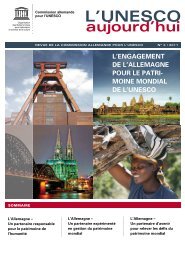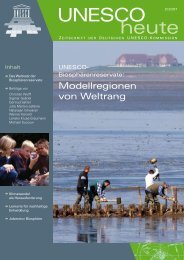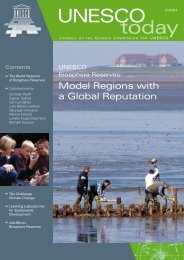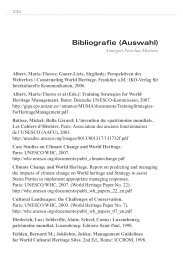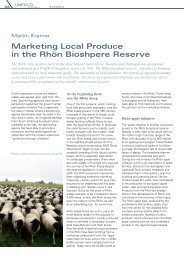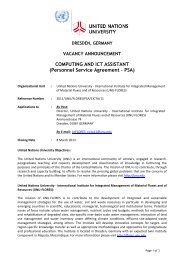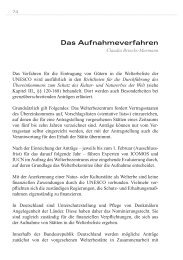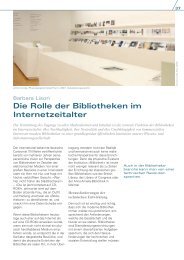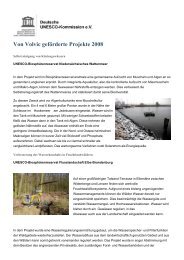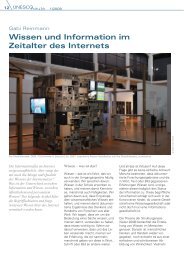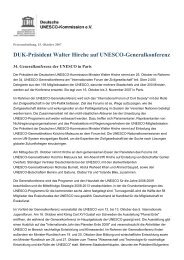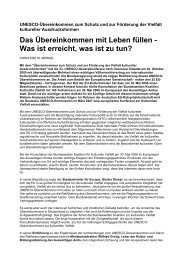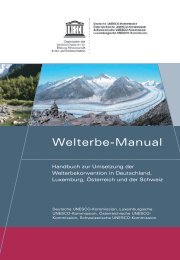CONFINTEA VI, final report - Unesco
CONFINTEA VI, final report - Unesco
CONFINTEA VI, final report - Unesco
Create successful ePaper yourself
Turn your PDF publications into a flip-book with our unique Google optimized e-Paper software.
Facilitators are looked upon as the most important<br />
element in quality of adult education. Yet many<br />
countries still rely on non-professional adult educators<br />
while others work with volunteers who are trained for<br />
adult education. In other countries, however, the adult<br />
educator is a certified teacher with a higher education<br />
degree. In still others, professional development<br />
frameworks are well established, and these are seen<br />
as indispensable to avoid high turn-over rates and to<br />
ensure motivation.<br />
Effective methods and instruments for assessing<br />
learning outcomes, including the validation of prior<br />
learning and which cover non-formal and informal<br />
learning, have not proliferated greatly. Most<br />
assessment of learning is carried out through national<br />
examinations. The area in which countries seem to<br />
have most diverse experience is in the formulation<br />
of quality criteria and standards in adult education.<br />
In some countries, input, process, output and impact<br />
standards and indicators have been defined and are<br />
being proposed and in some cases are already in use.<br />
Other countries have few indicators or reference points<br />
for adult education.<br />
(6) The way forward<br />
Panel participants<br />
Ms Rosalie Kama Niamayoua, Minister of Primary and<br />
Secondary Education, Congo Brazzaville<br />
Ms Nora Bin Abdullah Alfaiz, Vice Minister of Education<br />
for Girls, Saudi-Arabia<br />
Ms Silvia Chumira Rojas, Vice Minister,<br />
Ministerio de Educación, Bolivia<br />
Ms Amina Osman, Education Specialist –<br />
Gender & Quality Education, UNICEF<br />
Ms Fabienne Lagier, Education Advisor,<br />
Swiss Development and Cooperation Agency (SDC)<br />
Mr Guodong Xie, Secretary General / Vice President,<br />
China Adult Education Association<br />
Mr Mahamadou Cheikh Diarra, Coordinator,<br />
African Platform for Adult Education based in Mali<br />
The purpose of this session was for panellists to<br />
summarise the key messages that they gleaned from<br />
the Conference which would enhance or shape their<br />
countries’ efforts to promote and develop adult<br />
education further.<br />
18<br />
Governmental panellists committed themselves to<br />
giving higher priority to adult education and literacy<br />
on returning to their home countries, and to seek to<br />
work on, among other issues, migration, food security<br />
and climate change. The participation of women,<br />
of indigenous and rural populations would also be<br />
high on the agenda. A holistic approach to human<br />
development must recognise what adults already know<br />
from their daily lives and their ancestral and cultural<br />
roots, and must incorporate inter-culturality and multilingualism.<br />
It was recognised that adult education is a collective<br />
responsibility, and that the international community<br />
has to provide monitoring support to Member States.<br />
Civil society organisations also have to be involved in<br />
partnership.<br />
Asked to indicate what kinds of mechanisms for<br />
regional and national monitoring should be put in<br />
place, panellists considered measures, processes and<br />
who needs to be involved.<br />
• It is important first to decide on targets and<br />
objectives, and then the appropriate assessment,<br />
evaluation and monitoring criteria, which may<br />
include achievement, results-based and impact<br />
measures.<br />
• Better communication and international dialogue<br />
would be facilitated by harmonising the language<br />
used – that is, by arriving at common conceptual<br />
understandings. A first step would be to<br />
disseminate results from <strong>CONFINTEA</strong> itself. As the<br />
Global Report on Adult Learning and Education has<br />
shown, self-<strong>report</strong>ing may not be systematic<br />
enough.<br />
• Monitoring should involve all key players,<br />
including civil society. This process could<br />
be coordinated at country level by units either<br />
independent of or within ministries. At<br />
regional level, regional cooperation councils<br />
could be a constructive mechanism. Partnerships<br />
with international agencies such as UNESCO and<br />
UNICEF were also seen to be important.<br />
Post-<strong>CONFINTEA</strong> <strong>VI</strong>, panellists pointed out that,<br />
beyond rubber-stamping literacy rates in Member<br />
States, UNESCO and UIL in particular would have<br />
a leading role in giving active support through<br />
continued advocacy for adult literacy, capacity-


